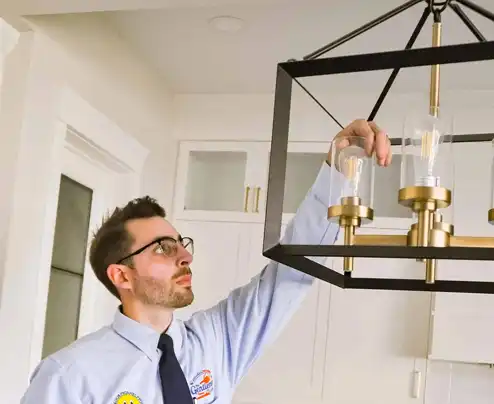Same Day Service
Since 2001
Call The Gentleman Pros Now!
(403) 755-4914

You don’t need to tolerate bad lighting. Lighting has a dramatic impact on your comfort level in your own house and it has a multitude of other great benefits. Our skilled electricians can help you with your new lighting and fix any problems you have with your current lighting.
“Dietmar was AMAZING to deal with. Explained everything he was doing so there was no surprises. Gave us a quote and final bill was under what he quoted. Would highly suggest this company for all plumbing needs :)” Ally L

Good lighting can improve everything from the value of your house to your mood. It can:
You deserve quality work, prompt and friendly service, and upfront pricing. And we will provide all of this plus we clean up after ourselves.
Ready to fix your lights or install new ones? Call (403) 755-4914 and one of our excellent customer service agents will schedule an electrician to come visit you. Or you can fill out our convenient online form or chat with us right now by clicking on the red Chat With Us button at the bottom of the page.
Colour temperature is a way to describe a light’s appearance. Lightbulbs are measured in Kelvin (K) starting around 1,000 K and going to 10,000 K.
Kelvin is a temperature scale that starts at 0 K and because it starts at 0 K it doesn’t have negative temperatures.
Water freezes at 273.15 K and boils at 373.15 K.
Now back to the colour of light. The lower on the Kelvin scale, the warmer the light colour, and the higher on the scale, the cooler the light colour.
Extra warm white light – 2,500 K
Warm white light – 2,700 K
White light – 3,500 K
Cool white light – 4,000 K
Daylight – 6,500 K
Lightbulb packaging usually includes the Kelvin measurement of the bulb. This makes it easy to replace the lightbulbs you have with the same colour lightbulb.
Yes, there are many different types and styles of lightbulbs on the market.
Incandescent lightbulbs were once the industry standard. They use filaments that glow when heated by electricity. These are inexpensive bulbs but they aren’t as energy efficient nor do they last as long as other lightbulbs.
Many countries have banned the import and sale of some styles of incandescent lightbulbs.
Effective January 1, 2014, the Canadian government banned the import and sale of 75 W and 100 W incandescent bulbs.
Effective January 1, 2015, the Canadian government banned the import and sale of 40 W and 60 W incandescent lightbulbs.
We are all familiar with these long tubular lightbulbs, sometimes called linear fluorescent bulbs. They are filled with mercury vapor and when you add electricity the vapor emits ultraviolet (UV) light. The tubes are coated with phosphor powder which turns the UV rays into visible light.
Fluorescent lightbulbs are energy-efficient and last a long time. However, disposing of them could be difficult due to the mercury in them. The mercury is perfectly safe during normal operation but becomes a problem when it’s time to throw them away.
Please check how to dispose of them in your area. For example, the City of Red Deer accepts fluorescent lightbulbs as part of their household hazardous waste program.
Compact fluorescent lightbulbs, more commonly known as CFLs, are a twist on the long tubular fluorescent bulbs. They are literally a twist. They work the same way but the tube has been shaped into a spiral so it can fit a standard lightbulb socket.
CFLs come in a wide variety of lumens, base types, colour temperatures, and sizes. They are a popular choice because they are energy-efficient, have a long lifespan (up to 10,000 hours), and have high luminous efficiency. Luminous efficiency is how well a light source produces visible light
They are similar to standard fluorescent lightbulbs they can be difficult to dispose of due to their mercury. Please check with your local jurisdiction on how to throw them away.
In Red Deer, CFL bulbs are accepted at the landfill or a Household Hazardous Waste drop-off depot under their household hazardous waste program.
Halogen lightbulbs are a type of incandescent bulbs. What makes them different from standard incandescent bulbs is they use halogen gas to increase the bulb’s light output and to increase their lifespan.
Because they produce a bright white light, they are great for fixtures that produce focused rays of light. For example, in the fixtures that light your workspaces in your home.
They do get very hot, so please be careful when touching them.
LED bulbs use light-emitting diodes to produce light. Light-emitting diodes are semiconductor devices that produce visible light when electricity passes through them.
LEDs are solid-state lighting (SSL) meaning it doesn’t use any moving parts are gases to produce light.
They are very energy-efficient when compared to other lightbulbs and are versatile. They come in a variety of shapes, sizes, and colours. You can even program some of them.
They are incredibly long-lasting, up to 50,000 hours.
Initially, LEDs were very expensive but they have come down significantly in price making them a popular option in our homes.
HID lightbulbs discharge electricity between two electrodes and through plasma (ionized gas) and the resulting electric arc produces light.
They are energy-efficient lightbulbs compared to CFLs and incandescent bulbs and have a long lifespan.
HID lights emit a lot of bright light and are best used when you need to light a large area — for example, your yard or a large room with high ceilings.
For more answers to your lighting questions, check out Part 1 and Part 3.
Adding new plugs in your home can add versatility and options for plugging your electrical needs in. Most people are looking for an additional location for TV or home office. Damaged plugs are a hazard and will need to be changed out for new ones. Damaged plugs could be burned or brittle, cracks in them or even if they don’t hold your cords in tight, and will need to be changed out for new ones.
Some types of plugs you can upgrade to:



